Crises put Swiss political system to the test
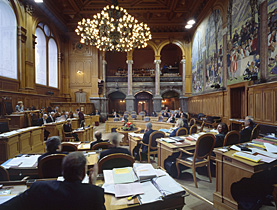
The traditional Swiss system of power-sharing and consensus in government has withstood major political upsets over the past two years.
But political experts say the cabinet showed signs of weakness in handling the crisis over banking secrecy and the diplomatic row with Libya.
In contrast to the image of Switzerland as a haven of political stability, the country has been going through a turbulent period since 2007 when parliament and the cabinet began their four-year terms:
A cabinet minister was unseated, the largest of the four main political groups decided to go into opposition, two cabinet ministers joined a new party – and as a result, a seven-member cabinet was made up of members of five different parties.
The changes on the political stage could be termed unusual in modern-day Swiss democracy or even historic.
For nearly half a century, from 1959 to 2003, the allocation of seats in the Swiss cabinet had remained unchanged under what became known as the Magic Formula.
Since then there has been an element of uncertainty in Swiss politics, which have become a touch more unpredictable. But the pillars of the system have not collapsed as some had feared.
On the contrary, a new form of stability was established. The political parties have held onto their share vote, according to a survey by a leading research institute.
And the alliances between the groups in parliament and government over specific issues have remained intact.
Small steps
Andreas Ladner, political scientist at the Swiss Graduate School of Public Administration in Lausanne, says world affairs have an impact – although a limited one – on the course of Swiss politics.
“Major political issues and the global economic crisis have certainly had repercussions for Switzerland, the parties and their strategies. But political life is slow and moves in small steps only.
“There are a number of in-built hurdles and limits that block hasty and radical changes. At least as long as the main principles and the strengths of the political parties remain the same,” Ladner said.
As a result neither the centre-right nor the centre-left have an absolute majority.
New perspective
The turbulent past few years have shown a new political perspective on a national level. The consensus system, which was based on the traditional power-sharing formula in cabinet, was able to adapt to the changes.
It even stood the test in a renewed confrontation between the two main centre-right parties – the Radicals and the Christian Democrats – in a fight over a cabinet seat.
“The Swiss system must not be reduced to consent on the allocation of cabinet posts between the main parties. It does not exclude disagreement between the groups ahead of taking decisions,” says Silvano Moeckli, political scientist at St Gallen University.
“It is the ability to find a compromise acceptable for all sides in the end, a solution in the common interest and based on the democratic institutions.”
Under fire
The government faced a fair deal of criticism over its decisions in the past few months. It was accused of weakness in dealing with the financial crisis and defending Swiss banking secrecy and in handling the diplomatic row with Libya.
Moeckli agrees that the government failed to show a clear strategy and a unified position in those cases, but this is partly due to the strong position a cabinet minister has under the Swiss system.
“The only choice the government has is to demonstrate at home and abroad that it speaks with one voice,” Moeckli said.
He adds that the problem in the recent crises “was not the government system, but the people that are in the cabinet”.

More
Magic Formula
Unfinished work
Over the past two years parliament has not managed to advance on major issues left over from the previous term.
It was faced with unexpected crises and, often against its own will, had to accept decisions by the government, notably in the case of banking data handed over to the United States or the destruction of files in a case of suspected nuclear proliferation.
“Indeed lawmakers had to make extra efforts to deal with issues that were not tabled on the programme of this term such as the UBS bank and banking secrecy,” said Moeckli.
“A lot of time was also taken up by rivalries between cabinet ministers and to elect successors to Defence Minister Samuel Schmid and Economics Minister Pascal Couchepin who both stepped down.”
Armando Mombelli, swissinfo.ch (adapted from Italian by Urs Geiser)
Parliamentary elections take place every four years.
The three-week autumn session which ended last Friday marked midterm.
The next elections are scheduled for October 2011, followed by cabinet elections in December 2011.
Halfway through the legislative term, parliament has not succeeded in solving some of the most pressing issues, including reforms of the health system and the old age pension scheme.
The party-political make-up of the cabinet remained unchanged over 1959-2003: Two seats each for the Radical Party, the Christian Democrats, the Social Democrats and one seat for the Swiss People’s Party.
In the wake of the 2003 parliamentary elections Christoph Blocher won a second seat for his People’s Party at the expense of the Christian Democrats.
Four years later parliament unseats Blocher and elects Eveline Widmer-Schlumpf instead. As a result of internal party divisions the Conservative Democratic Party is founded which has two seats in the cabinet.
In 2008 the People’s Party returns to the government with one seat.
The cabinet is currently made up of two members of the Radicals and the Social Democrats, and one Christian Democrat, one Conservative Democrat and a representative of the People’s Party.
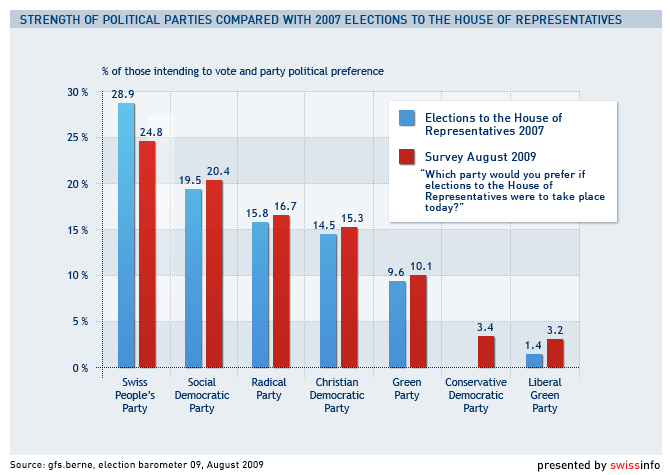

In compliance with the JTI standards
More: SWI swissinfo.ch certified by the Journalism Trust Initiative


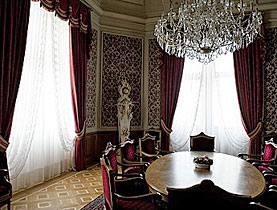
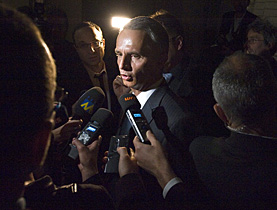
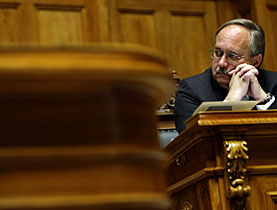
You can find an overview of ongoing debates with our journalists here. Please join us!
If you want to start a conversation about a topic raised in this article or want to report factual errors, email us at english@swissinfo.ch.